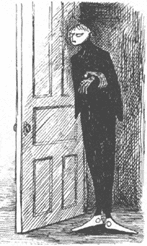Well, Cathryn had a good point in a comment below that she knows next to nothing about fibro and is always interested in learning more, so I figured, what the hey, why not post about it a bit?
Firstly, some useful links:
- But You Don’t Look Sick? – Not technically about fibro, but definitely about similar conditions that are “invisible.”
- National Fibromyalgia Association – Website for a US organization for fibro education and support.
- UKFibromyalgia.com – Great UK site.
- Fibromyalgia – long, in-depth look at fibro on About.com.
For them as are too lazy to click and read all of that, here’s a super-short FAQ, by moi:
Disclaimer: I’m not a doctor. Duh.
What is fibromyalgia (aka fibro or FMS)?
Basically, it’s a condition where you feel like you have the flu or something – muscle/joint/bone pain, mental fogginess, muscular weakness, etc. Sometimes patients with fibro develop things like irritable bowel syndrome, depression, migraine, etc.
Wow, that sucks. What causes it?
It sure does. We don’t know what causes it. I’ve heard people say their fibro cropped up after a car accident or serious illnes, and others (like me) came down with it out of nowhere.
Is it contagious?
No. It might be hereditary, but there’s no proof of that.
How do you treat it? Is there a cure?
There’s an article on treatment here. Fibro has no known cure at present, but there are plenty of treatments. Each patient will respond to different treatments differently. Some of the meds used include muscle relaxants, pain medication, and seratonin reuptake inhibitors.
Aren’t seratonin reuptake inhibitors used to treat depression?
They sure are, but in much higher doses than for treating fibro. Scientists aren’t 100% sure why they work on fibro. There’s a theory that maybe fibro is caused by pain nerves malfunctioning and they help them to function correctly.
How is fibro diagnosed in the first place?
Well, from my own experience, mostly by ruling out other things. Fibro doesn’t show up on bloodwork and there aren’t any tests you can run on body fluids or the skin or anything to see if you have it. The closest thing to a test is the tender points test, where the doctor pokes you in 18 specific spots. If you are unusually tender in 11 or more you have fibro (I was tender in all 18).
What kinds of life changes do you have to make if you have fibro?
Well, number one seems to be getting enough sleep. People with fibro generally don’t get enough deep sleep (although there’s debate about whether that’s a cause of fibro or an effect), and need to get as much sleep as they can to minimize the impact of that lack. I know from my own experience that a short night is a bad, bad thing. Folks with severe fibromyalgia find they have to make a lot of time to rest during the day, as well. Not necessarily to sleep, just to not be moving around a lot.
Exercise is also a vitally important part of the fibro patient’s life, although it can be very difficult to actually exercise when you feel lousy during a major flare up. Still, studies show that regular exercise helps reduce symtoms.
Stress reduction is also important – high stress levels often cause symptoms to flare up dramatically.
Wow, dood, that sucks. What can friends/family do to help out?
Not a lot directly. Be supportive and understanding. Not give folks with fibro a lot of crap about it being all in their heads or that they should tough it out or something. This is a potentially debilitating condition, and not all in our heads.



